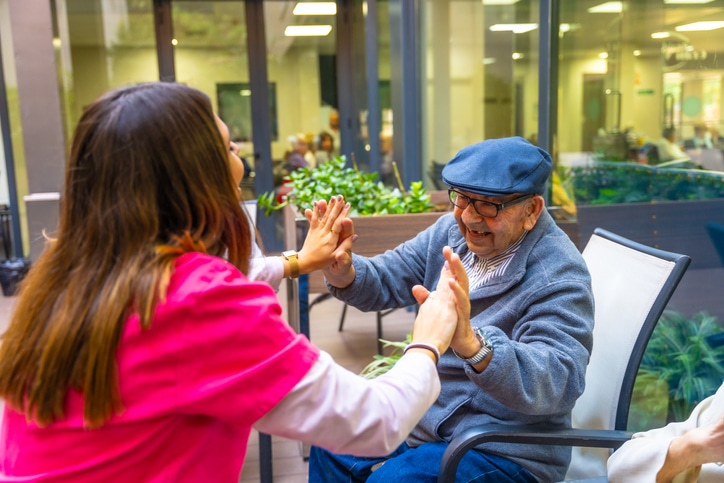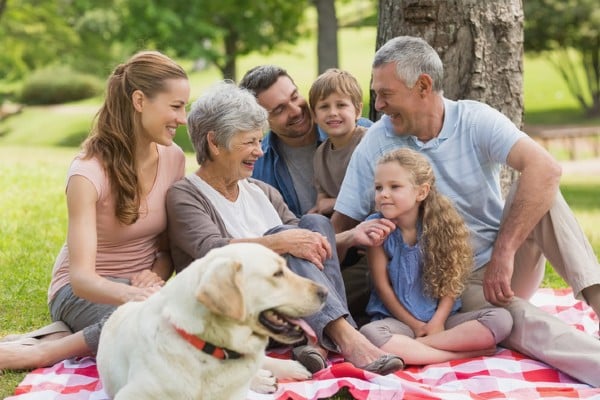Consistent and engaging social interaction is important in contributing to overall health and well-being, especially for seniors who are dealing with isolation & loneliness. Meaningful relationships with friends and loved ones are a big part of what helps us feel connected to the world around us, reminding us that we not only have the capacity to care deeply for others but also that others care about and value us.
Interacting with others in fulfilling ways should be an essential aspect of day-to-day life for everyone at any age. Unfortunately, for many seniors, isolation and loneliness are much more prevalent than one might think. Focusing on the sense of connectedness that is so necessary and valuable to overall health can be extremely helpful for our aging loved ones.
Isolation & Loneliness in Seniors
Growing older impacts some aspects of life that can make it more challenging for seniors to forge or maintain relationships and a sense of belonging. The following are a few examples of possible contributors to feelings of loneliness and isolation among seniors:
- Death of a spouse or partner
- Children or grandchildren are not in close proximity
- Loss of existing friendship groups or networks
- Fears related to leaving the house as a result of diminished mobility or symptoms of illness
- Worries about burdening others
- More incredible difficulty communicating as a result of speech or hearing problems
Risk Factors of Senior Isolation
For many seniors, staying home alone can seem more manageable than navigating some or all of the abovementioned factors. Because of this, many seniors allow themselves to sink deeper into feelings of isolation, loneliness, or depression. Some of the risks associated with prolonged feelings of isolation in seniors include:
- Increased Stress or Anxiety
- Depression
- Suicidal thoughts
- Problems Sleeping
- Increasing risk of chronic disease, particularly cardiac or vascular diseases
- Cognitive decline
- Greater reduction in mobility
- Hesitancy to leave the house for social activities and events
How to Combat Feelings of Isolation in Seniors
When considering the potential risks of isolation, it becomes evident how important it is to help our senior loved ones remain connected and socially engaged in meaningful ways.
The following are some suggestions to reduce feelings of isolation and loneliness:
Technology
Modern technologies such as social media and video conferencing are not just tools, they are gateways to a world of connectivity. They make it increasingly simple to maintain a degree of connectivity with loved ones near or far away without having to venture outside. Introducing seniors to technology can give them a sense of agency and independence by reaching out and maintaining the relationships they value.
Pet Companionship
Bonding with a pet can offer a sense of companionship to keep spirits up. Being a pet owner can provide constant companionship and unconditional love, significantly reducing loneliness and isolation, especially for seniors living alone. For seniors with dementia or other cognitive impairments, pets can provide calming sensory stimulation and minimize agitation.

Transportation
Ensuring reliable transportation is available allows seniors to go out and see others or participate in activities without feeling like they are burdening others by asking for a ride. The freedom and independence to travel to activities and dates with friends or family can make a meaningful difference in seniors’ enthusiasm for socializing.
Shared Meals
Visiting your senior loved one to share a meal or encouraging them to arrange meals together with others can be a great way to boost social activity. Eating meals with friends and family is not just a routine, it’s an opportunity to share stories, laughter, and love, making it an accessible and practical way to incorporate social interaction into existing routines.
Church Community
Many seniors value maintaining a sense of connectedness to a higher being and to other people who share a common system of beliefs. Arrangements for seniors to attend services and activities in places of worship can allow them to remain connected to their values and to other people who share them, providing a sense of spiritual fulfillment and community.
Home Caregivers
Home care services offered by a professional home care agency can provide additional companionship and support for social activities, preserving your loved one’s independence and peace of mind.

In-Home Care Services Kitchener-Waterloo-Cambridge
Staying connected becomes increasingly difficult for many seniors as they age and their networks and capabilities change. Maintaining social relationships takes effort, and making time to do so should be a top priority for seniors.
At Promyse Home Care, we are committed to enriching the lives of seniors by providing exceptional in-home care services in the Kitchener, Waterloo, and Cambridge regions. Our tailored approach ensures that every senior we care for enjoys a life of dignity, comfort, and independence in the familiar surroundings of their home.
Loneliness can be a silent struggle for many seniors, impacting their mental and emotional well-being. Promyse Home Care acts as a beacon of light in these moments of solitude. Our dedicated companions offer practical assistance with daily tasks and genuine companionship, alleviating feelings of isolation.
Through engaging activities, outings, and heartfelt conversations, our companions bring warmth into the lives of seniors. The transformative power of a caring companion extends beyond the immediate alleviation of loneliness; it contributes to improved mental health, increased feelings of security, and an enhanced overall quality of life.




